上财会计与财务研究方法论李增泉教授课件
- 格式:ppt
- 大小:2.66 MB
- 文档页数:143
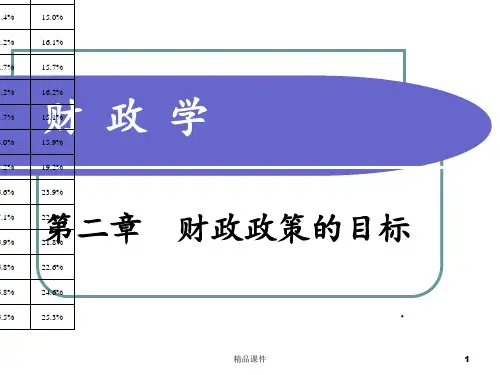


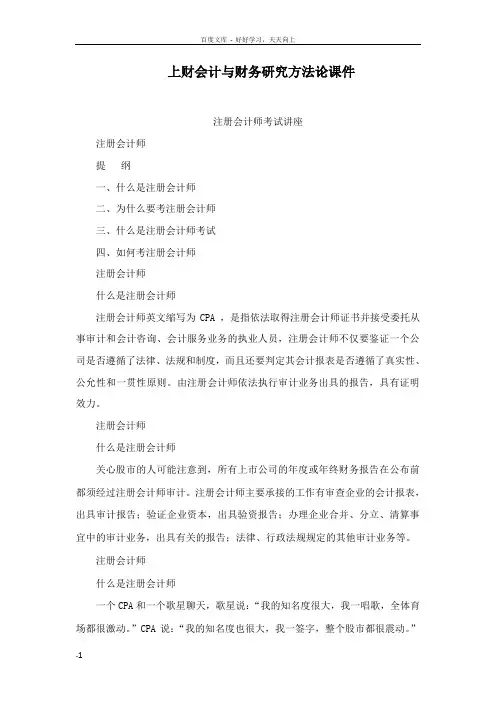
上财会计与财务研究方法论课件注册会计师考试讲座注册会计师提纲一、什么是注册会计师二、为什么要考注册会计师三、什么是注册会计师考试四、如何考注册会计师注册会计师什么是注册会计师注册会计师英文缩写为CPA ,是指依法取得注册会计师证书并接受委托从事审计和会计咨询、会计服务业务的执业人员,注册会计师不仅要鉴证一个公司是否遵循了法律、法规和制度,而且还要判定其会计报表是否遵循了真实性、公允性和一贯性原则。
由注册会计师依法执行审计业务出具的报告,具有证明效力。
注册会计师什么是注册会计师关心股市的人可能注意到,所有上市公司的年度或年终财务报告在公布前都须经过注册会计师审计。
注册会计师主要承接的工作有审查企业的会计报表,出具审计报告;验证企业资本,出具验资报告;办理企业合并、分立、清算事宜中的审计业务,出具有关的报告;法律、行政法规规定的其他审计业务等。
注册会计师什么是注册会计师一个CPA和一个歌星聊天,歌星说:“我的知名度很大,我一唱歌,全体育场都很激动。
”CPA说:“我的知名度也很大,我一签字,整个股市都很震动。
”歌星说:“全国各地都有喜欢我的歌迷。
”CPA说:“全国各地都有痛恨我的股民。
”相关链接:美国安然事件和安信会计师事务所注册会计师为什么要考注册会计师理由一:注册会计师是有“成就”的表现理由二:注册会计师有前途,又有“钱途”理由三:注册会计师资格是就业的“敲门砖”理由四:考注册会计师是学习会计等相关知识的有效途径和手段注册会计师注册会计师是有“成就”的表现在财经业内,注册会计师的地位毋庸置疑。
业内用“注会就是管会计的”这句话来简单形容注册会计师的身份和其工作性质,虽然也不尽然,但与持证人数高达1200万的会计人员相比,注册会计师人数寥寥无几,注册会计师成为爬上金字塔顶的极少数人群。
自1991年试行注册会计师考试以来,截止现在全国17次考试中已有近16万人通过全部科目考试。
注册会计师注册会计师是有“成就”的表现这16万人中,真正从事注册会计师行业,具有执业资格的大约占一半,约7万人。

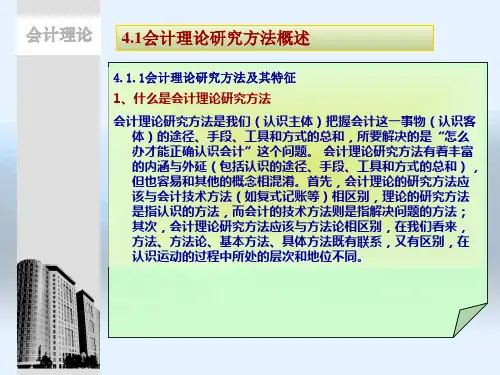

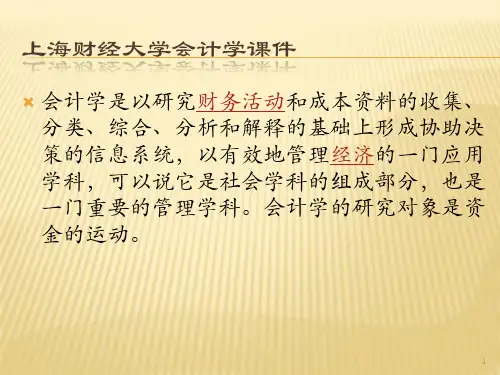

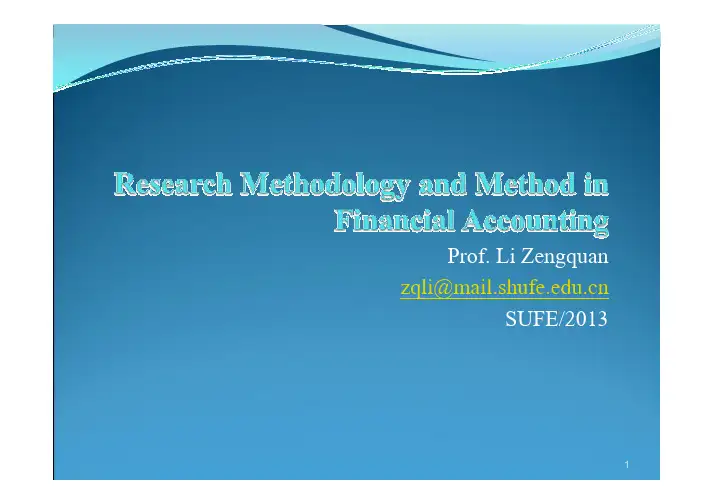
Prof. Li Zengquan zqli@ SUFE/20131研究的概念y 研究成果的三要素 y 研究的问题 y 研究的方法 y 研究的结论 y 研究成果的贡献点 y 问题 y 理论 y 方法y 数据 y 计量y 写作2引子:独立董事的价值3引子:独立董事的价值4引子:独立董事的价值5引子:独立董事的价值2010年度优秀独立董事证监会是否应该规定公司必 须聘请独立董事?9能够监督内部人 9能够为公司提供咨询 9能够降低监管部门的责任 9能够为会计教授提供赚钱机会 9不能够监督内部人 9不能够为公司提供咨询 9不能够降低监管部门的责任 9不能够为会计教授提供赚钱机会他们真的很厉害?可以抑制掏空、提供咨询、 扶贫教授、保护官员?答案好像是唯一的!推理可信吗?事实可靠吗?以独立董事为例有人发现,独立董事越多(比例 或人数,或有/没有)的公司,价 值(会计指标或股价指标)越高。
该发现可 以说明独 立董事的 价值吗?疑问1:有其他解释吗? 疑问2:穷尽了任何公司的任何时点吗? 疑问3:事实可信吗?(何谓公司价值)以上例子中的方法论问题y 研究问题:实证性命题(是什么?为什么)与规范性命题(怎么办?) y 检验方法:推理与感知、归纳与演绎 y 计量方法:内生性PART I: The nature of theory11Nature of accounting theoryy Positive and normative propositions y Positive propositions are concerned with how the world works. They take the form ‘if A then B’ and are refutable y Normative propositions are concerned with prescriptions. They take the form ‘ given the sets of conditions C, alternative D should be chosen. y Positive theory does not make normative propositions unimportant, and visa. y The objective of accounting theory is to explain and predictaccounting practicey Explanation means providing reasons for observed practice (includingaccounting and auditing practice) y Prediction of accounting practice means that the theory predicts unobserved accounting phenomena, which are not necessarily future phenomena.12Nature of theoryy The choose of theoryy We can’s find a theory that explains and predicts allaccounting phenomena. The reason is that theories are simplifications of reality and the world is complex and changing. y What determines the success and survival of a theory?y One important determinant is the value of the theory to users y We choose the theory which best holds its own in competition withother theories; the one which, by natural selection, proves itself the fittest to survive (Popper, 1959)13Robert W. Holthausena, Ross L. Watts In Journal of Accounting and Economics 31 (2001) 3–75Outliney This paper will discuss y What’s the underlying theory of value-relevance literatures? y Why they are not descriptive? y What should we do?the underlying theoryy What is the value-relevance literature? y papers investigate the empirical relation between stock market values (or changes in values) and particular accounting numbers for the purpose of assessing or providing a basis of assessing those numbers’ use or proposed use in an accounting standard.the underlying theoryy Three types (24-53-7/62)y Relative association studies compare the association betweenstock market values (or changes in values) and alternative bottomline measures. y Incremental association studies investigate whether the accounting number of interest is helpful in explaining value or returns (over long windows) given other specified variables. y Marginal information content studies investigate whether a particular accounting number adds to the information set available to investorsthe underlying theoryy Theories underlying such studies y In direct valuation theory accounting earnings is intended to either measure, or be highly associated with, equity market value changes or levels (via permanent income).y Given direct valuation theory, standard setters would beinterested in the results of a study of the relative stock price associations of alternative accounting earnings or book value of equity measures.the underlying theoryy In inputs-to-equity valuation theory, accounting’s role is toprovide information on inputs to valuation models that investors use in valuing firms’ equity.y Under an inputs-to-equity valuation theory standard setters aremore likely to be interested in a study that suggests investors could use an accounting number or a potential accounting number in their valuation models.the underlying theoryy In both cases, earnings would measure, or be highlyassociated with equity market values or changes in equity market values, and equity book values would measure, or be highly associated with, equity market values. y Essentially value-relevance studies imply accounting’s role is to provide estimates of equity market values or linear transformations of equity market values (direct equity valuation).Why are the theories not descriptive?y The GAAP Statement y The practice of accounting y The valuation modelFASB statements and value-relevance theoriesy three assumptions made by value-relevance studies thatare inconsistent with FASB statementsy users and uses of financial reporting y Whether do the stock prices adequately represent equityinvestors’ use of information in valuing equity securities y Whether do the stock price- based tests of relevance and reliability measure relevance and reliability as defined by FASB statementsValue relevance and GAAPy Balance sheet y The nature of the balance sheety the balance sheet still consists mostly of individual, separableassets and liabilities just as it did prior to the Securities Acts. y The treatment of goodwilly The evolution of the balance sheety There is some suggestion that other factors, in particularregulatory and litigation concerns, also played a role in determining the balance sheet’s nature y write-upsValue relevance and GAAPy The conservatism of the income statementy Contracting y Litigation y Regulation y Taxy Articulation of the balance sheet and the incomestatement and the nature of dirty surplusy consistent with forces other than equity valuationinfluencing accounting standard setting, in particular contracting.y The centrality of non-valuation factors in accountingpracticeThe valuation modely Balance sheet modely MVE =MVA +MVL + MVC; y The presence of rents could affect the sign of the coefficientof an asset or liability.y Earnings modely earnings changes are transient for extreme earningsy The Ohlson modely it does not allow for the existence of optionsy The valuation models employed in the value-relevance and capital markets literatures have no role for accountingConclusionsy While the existing value-relevance literature is large, itscontribution to standard setting seems modest.y The major reason is that the literature does not seek todevelop a descriptive theory of accounting and standard setting.y Standard setters would be aided if accounting researchersspent more resources investigating the many forces that shape accountingPart II: Evolution of accounting theory27Evolution of accounting theoryy Before 1950s,normativey In the late nineteenth and early twentieth centuries, accountingwriters were primarily concerned with describing observed practices and with providing pedagogical rules for classifying those practices y After 1933 and 1934, accounting theorists became much more concerned with prescribing how firms should reporty In the 1950-70, early economics based empirical researchy the accounting became to test hypotheses in the existingaccounting literature as the result of developments in finance. y Particularly, the efficient markets hypothesis eventually had a major impact on accounting research.28A case: Ball and Brown(1968)y A common hypothesis underling the prescriptions in theearly 1960s accounting literature is that corporate accounting reports are the only source of information on the corporation.y The argument leads to the prescription that all corporationsshould be required to use the same accounting procedures y The argument also led to criticisms of the calculation of accounting earnings29y The EMH’s implication y EMH suggests that this sole source hypothesis is unlikely to be descriptive and the stock market is not systematically misled by accounting earnings. y EMH implies that if there is an empirical association between earnings and stock prices, earning can be useful even if they are not calculated consistently in terms of a formal definition of income y Underlying the EMH is competition for information30y The EMH’s contradictions led to researchers’ addressingtwo questionsy Do changes in accounting methods and their earnings effectssystematically mislead the stock market? y Are accounting earnings associated with stock prices or changes in stock prices?31y Ball and Brown (JAR,1968) investigate the relationbetween the sign of unexpected earnings and mean abnormal rates of returny Abnormal return measuresy Market modely Unexpected earnings measuresy Random walk y Market adjusted model3233y The early economics based empirical studies inaccounting tested hypotheses in the existing accounting literature and investigated the relation between accounting numbers and economic variables and the time series of accounting numbers y That research takes the EMH as given and views accounting’s role as the supply of information to the capital markets, and find thaty Earnings reports supply information to the capital markets y Other accounting numbers reflect CAPM variables y Annual earnings are well described by a random walk34y Many of the studies assumed that the choice of accountingtechniques was irrelevant to the valuation of the firm, then they didn’t provide an explanation for the accounting practicey Attempts to discriminate between the EMH and theMechanistic hypothesis raised the possibility that tax-neutral accounting procedures have cash flow effects35y By the mid-1970s, positive accounting theory based oneconomics was emergingy The development of finance research y Accounting researcher’s observationy What is the objective of disclosure regulation? y Why do managers care about accounting procedures?y Implicationsy Dropping of the zero contracting costs assumption provided thedemand for a new positive accounting theory based on Neoinstitutional Economics36y Based on the theory of property right, the accountingpractice or accounting procedures are explained in such a way:y Contract costs and information costs are nonzero in thefirm’s contracting process and in the political process y Accounting is an integral part of the contracts that define the firm.y Accounting plays an important role both in contract terms and inmonitoring those terms y Contract costs vary with different accounting procedures y Survivorship principle implies that the procedures used to calculate accounting numbers used in those contracts are more efficient than are alternative procedures37y The contract roles of accounting based on the theory offirmy Accounting and auditing are used in compensation and debtcontract to reduce agency costs (Jensen and Meckling, 1976)y With competition and rational expectations, the agent bears thefull agency costs, the agent has the incentive to contract for the monitoring y The accounting and auditing is used to ensure the principals (shareholders and debt holders) that the contract has not been breached38y The role of accounting in the politicalprocess is different from that in the market processy Political process is viewed as a competition for wealthtransfers y The higher costs of concentrating property rights of improved monitoring implies that the political process will exhibit more opportunistic behavior than the market process39y Accounting numbers are often used in the political processas examples of a perceived crisis, through which the wealth is transferred to the government’s officersy y y yAsymmetric loss function Effects of potential crises Rate regulation taxes40y three hypothesis y Bonus plan hypothesisy Managers of firms with bonus plans are more likely to chooseaccounting procedures that shift reported earnings from future periods to the current period manger is to select accounting procedures that shift reported earnings from future periods to the current periody Debt/equity hypothesisy The larger a firm’s debt/equity ratio, the more likely the firm’sy Size hypothesisy the larger the firm, the more likely the manager is to chooseaccounting procedures that defer reported earnings from current to future periods41y Summary y The accounting procedures used in the firm’s contracts are an integral part of the contracting technologyy the accepted set evolves as part of the contracting technology andmaximizes the firm value y Managers choose procedures that maximized their utility, and their choices can result in wealth transfers among the contracting partiesy Test of the theory have focused on manager’s opportunisticbehavior and not on the choice of the accepted set of procedures42y However, the prediction and explanation of the acceptedset of procedures rather than managers’ choice from among the set is likely to be productive. It would enable better design of contractsy A survey of accounting procedures and contractingstructures used in different industries y Examine cross-sectional differences in contracts and accounting procedures across countries431990‐2000 (Fields, Lys and Vincent,2001JAE)y We conclude that research in the1990s made limited progressin expanding our understanding of accounting choicey one reason is that researchers generally focus on refiningknowledge of specific accounting choices or on narrow problems that accounting choices are presumed to address. y second reason is that accounting research generally fail to distinguish appropriately between what is endogenous and exogenous y Finally, absent a theory, researchers apparently limit their inquiries to the pathological, and perhaps less frequent, use of accounting choice and ignore the major role of accounting in normal, day-to-day situations.44After 2001 (Armstrong,Guay,Weber,JAE2010 )y In the governance area, papers have begun to explore howa commitment to financial reporting quality influences both board structure and ownership structure, although the causality of this relation is likely to go in both directions. y In the executive compensation area, a large literature on the relation between executives’ equity incentives and financial reporting quality has emerged. y Empirical research on the role of financial reporting in debt contracting has grown rapidly in recent years.45Accounting research in China46Part III: Accounting Research on China47节选自《制度、治理与会计》第一章 李增泉、孙铮著 (格致出版社、上海三联书店、上海人 民出版2009年出版)48提纲y 引言 y 理论框架 y 文献综述 y 未来研究方向 y 结论49引言y 本文的研究问题y 中国的会计问题应如何进行设问?y 讨论分析框架 y 综述国内文献 y 提出未来研究方向y 本文的基本假设y 实证会计的目的在于解释和预测会计实践(Watts and Zimmerman,1986),因此中国实证会计的目的在于解释和预测中国的会计实践 y 并非综述所有会计文献,仅针对需要的部分实证文献y 本文的基本观点y 未来的研究应基于中国的实践,运用产权理论分析制度与会计之间的关系。
